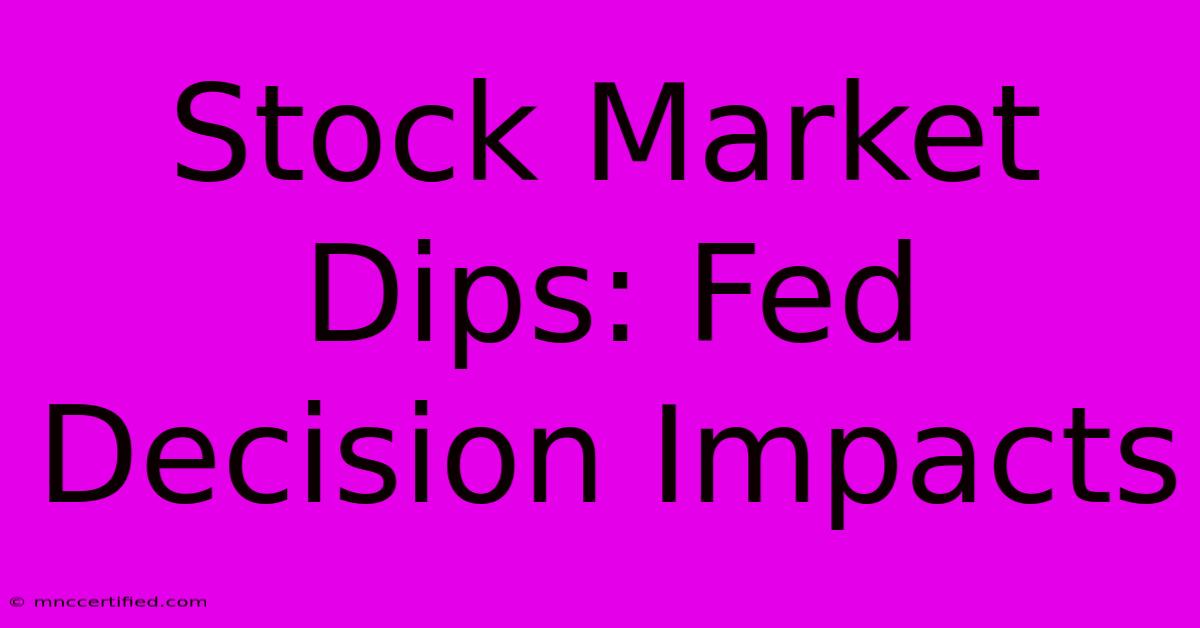Stock Market Dips: Fed Decision Impacts

Table of Contents
Stock Market Dips: Understanding the Impact of Fed Decisions
The stock market's intricate dance is often swayed by the rhythm of Federal Reserve (Fed) decisions. These decisions, particularly regarding interest rates, directly influence borrowing costs, inflation expectations, and overall economic growth – all key factors impacting stock prices. Understanding the relationship between Fed actions and market dips is crucial for investors of all levels. This article will delve into the mechanics of this relationship, exploring how Fed decisions trigger market volatility and providing strategies for navigating these turbulent periods.
Decoding the Fed's Influence: Interest Rates and Beyond
The Fed's primary tool for managing the economy is its federal funds rate, the target rate for overnight lending between banks. Changes to this rate ripple through the financial system.
-
Rate Hikes: When the Fed raises interest rates (a hawkish stance), it aims to curb inflation by making borrowing more expensive. This can slow economic growth, potentially leading to decreased corporate profits and lower stock valuations. Investors often react negatively to rate hikes, anticipating reduced future earnings. This often results in a stock market dip or correction.
-
Rate Cuts: Conversely, when the Fed lowers interest rates (a dovish stance), it aims to stimulate economic activity. Lower borrowing costs can boost business investment and consumer spending, potentially leading to higher corporate profits and increased stock prices. Rate cuts are generally viewed favorably by the market, although their effectiveness depends on various economic factors.
Beyond interest rates, the Fed's communications and forward guidance play a significant role. Statements made by Fed officials, particularly the Chair, regarding future policy intentions can heavily influence market sentiment. Unexpected shifts in the Fed's outlook can cause significant market volatility, even without immediate changes in interest rates.
Understanding Market Reactions: Fear and Uncertainty
Market dips following Fed decisions often stem from uncertainty. Investors grapple with how the changes will impact their portfolios and the broader economy. Fear of a recession or slower-than-expected growth can trigger sell-offs, leading to a decline in stock prices. The speed and magnitude of these dips depend on the unexpectedness of the decision, the market's overall sentiment, and the perceived impact on specific sectors.
Key factors influencing market reactions:
- Magnitude of the rate change: Larger rate hikes tend to cause more significant market dips than smaller adjustments.
- Market expectations: If the Fed's decision aligns with market expectations, the impact is usually less dramatic. Surprises, however, can cause heightened volatility.
- Economic conditions: The existing state of the economy influences the market's response. A robust economy might absorb rate hikes better than a fragile one.
- Investor sentiment: Broader market sentiment, influenced by geopolitical events and other news, can amplify or dampen the reaction to Fed decisions.
Navigating Market Volatility: Strategies for Investors
While Fed decisions can trigger market dips, they also present opportunities for savvy investors. Here are some strategies to consider:
- Diversification: A diversified portfolio can help mitigate the impact of market downturns. Spreading investments across different asset classes and sectors reduces exposure to any single risk factor.
- Long-term perspective: Market fluctuations are a normal part of the investment cycle. Maintaining a long-term investment horizon allows you to weather short-term volatility.
- Dollar-cost averaging: This strategy involves investing a fixed amount of money at regular intervals, regardless of market price. It helps to mitigate the risk of investing a lump sum at a market peak.
- Risk tolerance assessment: Understanding your own risk tolerance is crucial. Investors with a lower risk tolerance might consider shifting to less volatile investments during periods of uncertainty.
- Stay informed: Staying informed about economic indicators, Fed announcements, and market trends is essential for making informed investment decisions.
Conclusion: Preparing for Future Fed Impacts
The Fed's decisions significantly impact the stock market, and understanding this influence is paramount for successful investing. While market dips following Fed actions are common, investors can employ strategies to navigate these periods and potentially capitalize on opportunities. By focusing on diversification, a long-term perspective, and informed decision-making, investors can better position themselves to weather the storms of market volatility caused by Federal Reserve actions. Remember to always conduct thorough research and, if needed, consult with a financial advisor before making any significant investment decisions.

Thank you for visiting our website wich cover about Stock Market Dips: Fed Decision Impacts. We hope the information provided has been useful to you. Feel free to contact us if you have any questions or need further assistance. See you next time and dont miss to bookmark.
Featured Posts
-
Southampton Vs Liverpool Carabao Cup Result
Dec 19, 2024
-
Lillards New Adidas Lifetime Contract
Dec 19, 2024
-
Congress Gridlock Shutdown Looms
Dec 19, 2024
-
Celebrity Show Dent For Wallace
Dec 19, 2024
-
Michael Vick Coaching Norfolk
Dec 19, 2024